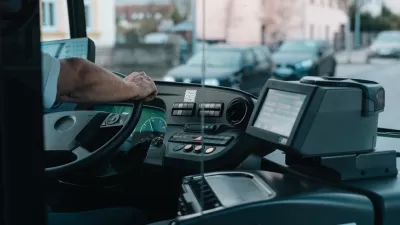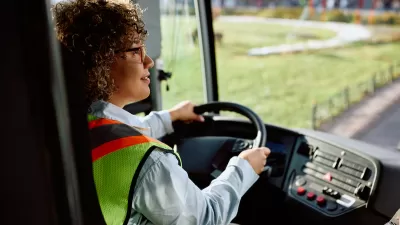More than nine in 10 U.S. transit agencies face operator shortages. A new report sheds light on the reasons why they’re having such a hard time attracting new hires.

A new report from Transit Center describes the operator shortage facing more than 90 percent of American transit agencies, which are struggling to fill bus driver positions. As Kea Wilson reports in Streetsblog, “those shortfalls are forcing a staggering 71 percent of providers to either cut or delay service, while others, like Los Angeles, are postponing service upgrades that would increase shared mobility access in the Black and brown neighborhoods that need it most.”
Wilson outlines the four reasons TransitCenter gives for the operator shortage. These include low starting pay and high retirement rates, workplace assault, “punishing” schedules, and an overall lack of respect and dignity—and restrooms. “A stunning 80 percent of transit workers say that not enough time is built into their schedules for them to simply use the bathroom — if they can even find one, given the dearth of public restrooms in most US cities, particularly during the pandemic — and 67 percent report that they’ve experienced health problems as a consequence.”
In addition to establishing channels for operators to voice their concerns to agency officials, report author and TransitCenter program manager Chris Van Eyken “emphasizes that agencies must take systemic approaches to making drivers feel valued and heard, starting with strong pay, strong safety protections, and schedules that they and their families can sustain.” Agencies must recognize the crucial role of operators in making transit systems function—and treat them accordingly.
FULL STORY: Four Factors Driving the Bus Operator Shortage (And What to Do About Them)

Maui's Vacation Rental Debate Turns Ugly
Verbal attacks, misinformation campaigns and fistfights plague a high-stakes debate to convert thousands of vacation rentals into long-term housing.

Planetizen Federal Action Tracker
A weekly monitor of how Trump’s orders and actions are impacting planners and planning in America.

In Urban Planning, AI Prompting Could be the New Design Thinking
Creativity has long been key to great urban design. What if we see AI as our new creative partner?

Portland Raises Parking Fees to Pay for Street Maintenance
The city is struggling to bridge a massive budget gap at the Bureau of Transportation, which largely depleted its reserves during the Civd-19 pandemic.

Spokane Mayor Introduces Housing Reforms Package
Mayor Lisa Brown’s proposals include deferring or waiving some development fees to encourage more affordable housing development.

Houston Mayor Kills Another Bike Lane
The mayor rejected a proposed bike lane in the Montrose district in keeping with his pledge to maintain car lanes.
Urban Design for Planners 1: Software Tools
This six-course series explores essential urban design concepts using open source software and equips planners with the tools they need to participate fully in the urban design process.
Planning for Universal Design
Learn the tools for implementing Universal Design in planning regulations.
Gallatin County Department of Planning & Community Development
Heyer Gruel & Associates PA
JM Goldson LLC
City of Camden Redevelopment Agency
City of Astoria
Transportation Research & Education Center (TREC) at Portland State University
Jefferson Parish Government
Camden Redevelopment Agency
City of Claremont





























